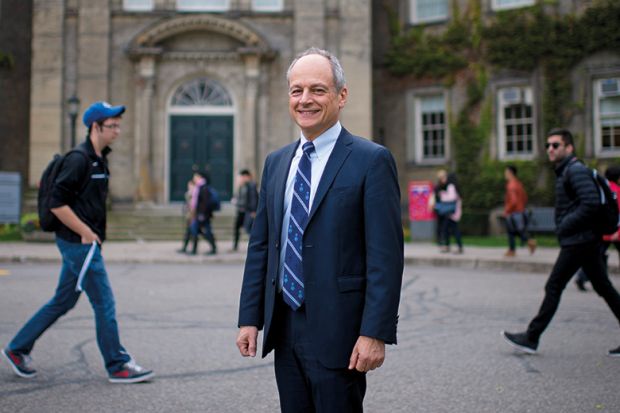The years-long Jordan Peterson saga was especially difficult for the University of Toronto, yet it was a vindication of the idea of standing firm on free-speech principles that prioritise open debate, the head of Canada’s leading academic institution has told his colleagues.
“It was not easy, I tell you, it was not easy at all,” Toronto’s president, Meric Gertler, acknowledged at Times Higher Education’s World Academic Summit.
“We did have concerns about security, we didn’t expect a civil discussion or respectful discussion – it would have been nice, but we didn’t expect it,” Professor Gertler said. “But frankly that too is an important point – we should be prepared to be uncomfortable, and to engage in these kinds of discussions.”
A native of Alberta, Professor Peterson is a clinical psychologist, author and one of a number of YouTube personalities pursuing popular attention by attempting to attach academic respectability to right-wing dogma.
In 2016 he clashed with university managers over a policy making anti-racism and anti-bias training mandatory among human resources staff, claiming it amounted to “political training” in “radical left ideology”, around the same time that he was opposing a Canadian government bill proposing to outlaw harassment and discrimination based on gender identity and gender expression
His more recent pronouncements have included suggesting that feminists subconsciously desire “brutal male domination”, proposing “enforced monogamy” as a “cure” for young men who feel sexually rejected by women, and calling developing nations “pits of catastrophe”.
He resigned his tenured post at Toronto in January, saying he felt he couldn’t keep subjecting his students to the career repercussions of being associated with him.
“Professor Peterson was a provocateur extraordinaire,” Professor Gertler said. “There were all kinds of calls for us to fire him, to shut him down, to censor him”.
But the university held firm on grounds of academic freedom. “Our position was, if he’s not breaking any laws or policies of the university, if he’s not openly inciting hate or violent behaviour, then I’m sorry to say that he has a right to express his views,” Professor Gertler said. “And if we are doing the right thing, we should be creating a platform to debate the positions that somebody like Professor Peterson would bring to the public realm, and that’s what we did.”
It’s a common struggle in higher education, in Canada and beyond. Lisa Coleman, the senior vice-president of global inclusion and strategic innovation at New York University, suggested to the THE summit that some institutions haven’t done enough work to both facilitate tough exchanges and set necessary limits.
“There is room for free speech, and then there is the annihilation of communities,” Dr Coleman said.
The patience shown by Toronto was also having clear political benefit, Professor Gertler said. The Progressive Conservative government of Doug Ford, the premier of Ontario, initially “was not very friendly to us”, Toronto’s president said. As one of its first acts after taking office in 2018, he said, the Ford team put forth free-speech legislation. Doing so is a tactic typically designed to aid conservative voices under the guise of protecting a diversity of views on campuses.
But the University of Toronto already had its own longstanding principles for protecting free speech while guarding against abuses, Professor Gertler said. That approach had proven popular with diverse groups, and the Ford government saw the political advantage of sticking with that, Professor Gertler said.
“This has actually played extremely well with this government,” he said, “because they have seen a lot of votes in those communities.”
Register to continue
Why register?
- Registration is free and only takes a moment
- Once registered, you can read 3 articles a month
- Sign up for our newsletter
Subscribe
Or subscribe for unlimited access to:
- Unlimited access to news, views, insights & reviews
- Digital editions
- Digital access to THE’s university and college rankings analysis
Already registered or a current subscriber? Login








